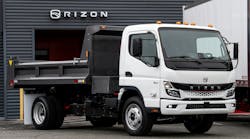Sweden’s Volvo Group, parent to both Volvo Trucks North America and Mack Trucks Inc., has announced it is introducing what it calls a fourth-generation hybrid solution “on a broad front” for trucks, buses and construction equipment.
“Our hybrid solution for heavy vehicles is completely different from anything that has existed in the market to date,” said CEO Leif Johansson. “As a result of our volumes and resources, we have succeeded in developing a more standardized platform solution, which is a prerequisite for the hybrid technology’s ability to have a widespread commercial impact in the market for heavy vehicles.”
Volvo Group, which has been testing various types of hybrid solutions since the 1980s and, noted it unveiled the first commercially viable hybrid solution for heavy vehicles in March of ’06. The global OEM said its solution is based on a concept known as I-SAM (Integrated Starter, Alternator Motor). This solution entails that an electric motor and a diesel engine work in parallel, whereby each of them can be used in the areas where they are most effective. This increases the capacity compared with series hybrids, while simultaneously reducing fuel consumption and improving driving characteristics, according to Volvo Group.
“This is what we call the fourth-generation hybrid technology,” said Johansson. “In a few years’ time, hybrid technology will no longer be a special solution but a technology found in most new city buses and distribution trucks. The fourth-generation hybrid technology has the potential to make such a development possible.”
Johansson said the “favorable commercial prospects for the Volvo Group’s hybrid technology” rest on it being based on a “platform solution containing a large number of standard components. The solutions that have existed in the market to date, and that the Volvo Group itself has been offering, have been based on a large proportion of special components, according to the company, impeding volume manufacturing and leading to vehicles becoming much more expensive than the equivalent standard vehicles.
Another advantage cited by the OEM is that by working off an adaptable platform solution allows for a variety of different products and applications, which further increases the volumes and reduces production costs.
“Volvo believes that the prospects are favorable for developing hybrid technology for all heavy vehicle segments, everything from buses and construction equipment to trucks for distribution and long-haul traffic,” added Johansson.
This fall Volvo Group will display a number of its hybrid vehicles at various trade shows, including IAA in Hanover, Germany, Sept. 25- Oct. 2. There Volvo Trucks will showcase what it calls the world’s first heavy hybrid refuse truck, the Volvo FE Hybrid. The truck, which was rolled out back in April, is one of two hybrid refuse trucks tested in Sweden by the Renova and RagnSells refuse-collection firms, noted the OEM.
According to Volvo Group, operating these hybrid refuse haulers can result in fuel savings of up to 20%t and a corresponding decrease in carbon-dioxide emissions. In addition, the OEM noted, the truck is “totally exhaust-free and silent during electrical powering, a factor that is important for refuse collection vehicles which often work in densely built-up areas early in the morning.”
For more information, visit the Volvo Group’s hybrid technology Web page.


